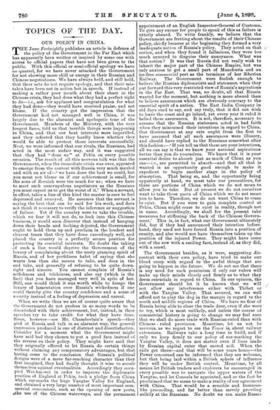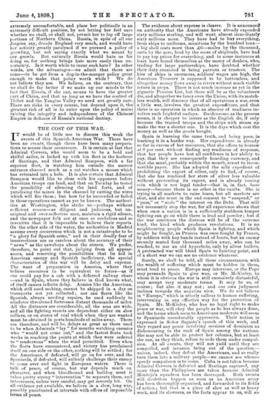TOPICS OF THE DAY.
OUR POLICY IN CHINA. THE June Fortnightly publishes an article in defence of the policy of the Government in the Far East which has apparently been written or inspired by some one with access to official papers that have not been given to the public. With this official or semi-official apology we have no quarrel, for we have never attacked the Government for not showing more skill or energy in their Russian and Chinese negotiations. We have always held, and still hold, that their acts do not require apology, and that their mis- takes have been not in action but in speech. If instead of making a rather poor mouth about their share in the Chinese crisis, they had done what they had a perfect right to do—i.e., ask for applause and congratulation for what they had done—they would have received praise, and not blame. If the country got the impression that the Government had not managed well in China, it was largely due to the alarmist and apologetic tone of the Government. Members of the Ministry, with the very longest faces, told us that terrible things were happening in China, and that our best interests were imperilled, and they inferred that they hardly knew whether they would be able to protect those interests successfully. Next, we were informed that our rivals, the Russians, had acted in the most unfair way. and it was suggested that they had "done us" at Pekin on every possible occasion. The result of all this nervous talk was that the Government, when the immediate crisis was over, appeared to emerge from the contest with Russia very much mauled and with an air of—' we have done the best we could, but you must not blame us if our achievement is small, for the sons of Zeruiah were too much for us; when we have to meet each unscrupulous negotiators as the Russians you must expect us to get the worst of it.' When a servant, in effect, takes a line of this kind the master is sure to feel depressed and annoyed. He assumes that the servant is saying the best that can be said for his work, and does not think it necessary to verify the inference or suggestion of failure. Yet if the country were to take the trouble, which we fear it will not do, to look into this Chinese business, it would soon discover that instead of hanging down their heads and looking dejected, the Government ought to hold them up and proclaim in the loudest and clearest tones that they have done exceedingly well, and placed the country in a perfectly secure position for protecting its essential interests. No doubt the taking of such a line would deprive the Government of the luxury of complaining about the nasty grasping spirit of Russia, and of her perfidious habit of saying that she wants less than she means to take, and does in the end take, and generally of refusing to be quite down- right and sincere. You cannot complain of Russia's selfishness and trickiness, and also say (which is the fact) that you have managed very well in spite of her. Still, one would think it was worth while to forego the luxury of lamentation over Russia's wickedness if one could thereby give the country confidence and a sense of security instead of a feeling of depression and unrest.
When we write thus we are of course quite aware that the Government do not profess in so many words to be dissatisfied with their achievement, but, instead, in their speeches try to take credit for what they have done. Since, however—see Mr. Chamberlain's speech—they gird at Russia and talk in an alarmist way, the general impression produced is one of distrust and dissatisfaction. Consider for a moment what the Government might have said had they chosen to put a good face instead of the reverse on their policy. They might have said that they originally offered to let Russia do certain things without claiming any compensatory advantages, but that having come to the conclusion that Russia's political designs were of a more far-reaching character than they first imagined, they had finally thought it wise to secure themselves against eventualities. Accordingly they occu- pied .Wei-hai-wei in order to improve the diplomatic position of England at Pekin, took a pledge from China which ear-marks the huge Yangtse Valley for England, and obtained a very large number of most important com- mercial concessions, such as the opening of new ports, *the use of the Chinese waterways, and the permanent appointment of an English Inspector-General of Customs_ To give any excuse for people to speak of this as failure is utterly absurd. To write frankly, we believe that the Government are fretting about the results of their Chinese policy, chiefly because at the beginning they formed a very inadequate notion of Russia's policy. They acted on that v notion, and when they found it fallacious, they were too. much annoyed to disguise their annoyance. What was that notion ? It was that Russia did not really wish to inherit the major part of the Chinese Empire, but was only anxious to get a small part of Manchuria and an ice-free commercial port as the terminus of her Siberian Railway. The Government were foolish enough to believe the Russian diplomatists and statesmen when they put forward this very restricted view of Russia's aspirations in the Far East. That was, no doubt, all that Russia wanted for the moment, but nothing is more absurd than to believe assurances which are obviously contrary to the essential spirit of a. nation. The East India Company in old days used to say, and say truly, that it did not wish to leave the coast and go inland, yet every year it ruled it belied those assurances. It is not, therefore, necessary to assume that the Russian statesmen acted in bad faith when they minimised their intentions in regard to China. Our Government at any rate ought from the first to have assumed that all such assurances were illusory, and should have replied to the Russians somewhat after this fashion:—' If you tell us that these are your intentions, all we can say is that we know your national aspirations better than you do yourselves. We know that it is your essential desire to absorb just as much of China as you can—i.e., are permitted to absorb—and that all that is wanted is an opportunity good enough to make it expedient to begin another stage in the policy of absorption. That being so, and the opportunity being apparently at hand, we must take our precautions, for there are portions of China which we do not mean to allow you to take. But at present we do not ourselves want to take those parts of China which we do not mean you to have. Therefore, we do not want China to cease to exist. But if you were to gain complete control at Pekin, China might cease to exist in reality, though not in name. Accordingly, we shall for the present take measures for stiffening the back of the Chinese Govern- ment.' This is, in fact, what our Government ultimately did, but if they had announced their intention before- hand, they need not have forced Russia into a position of enmity, and also would not have themselves taken up the position of the injured Power. They might have come out of the row with a smiling face, instead of, as they did, with a scowl.
The Government besides, as it were, suggesting dis- content with their own policy, have tried to make our blood creep with regard to the awful things that are going to happen in the future. We do not see that there is any need for such pessimism if only our rulers will make up their minds clearly and firmly as to what they deem essentials in regard to China. In our opinion, the Government should let it be known that we will not allow any interference either with Thibet or with the Yangtse Valley. That secured, we can well afford not to play the dog in the manger in regard to the north and middle regions of China. We have no fear of Russia being able to close the trade door, even if she were to try, which is most unlikely, and unless the course of commercial history is going to change we may feel sure that we shall do more trade with Russian-ruled than with Chinese - ruled provinces. Meantime, let us not be nervous, as we regret to see the Times is, about railway extensions. Railways take a long time to build, and if only we keep firmly to our policy of ear-marking the Yangtse Valley, it does not matter even if lines made by Russian capital enter that sacred soil. When the- rails get there—and that will be some years hence—the Power concerned can be informed that they are welcome, but that being laid within a British sphere of influence they will be under British control. Meantime, by all means let British traders and explorers be encouraged in every possible way to navigate the upper waters of the Yangtse, and let Consuls be appointed, and so the fact be proclaimed that we mean to make a reality of our agreement with China. That would be a sensible and business- like proceeding, and far better than merely growling sulkily at the Russians. No doubt we can make Russia, extremely uncomfortable, and place her politically in an extremely difficult position, by not letting her feel sure whether we shall, or shall not, permit her to lop off large portions of Northern China. Russia, in spite of all our Jingoes say, dreads England very much, and would have her activity greatly paralysed if we pursued a policy of growling, but not saying exactly what we meant by our growls. But naturally Russia would hate us for doing so, for nothing brings hate more easily than un- certainty. Is it worth while to incur such hate? In other words, are the advantages—we admit that there are some—to be got from a dog-in-the-manger policy great enough to make that policy worth while ? We do not believe they are. We believe, on the contrary, that we shall do far better if we make up our minds to the fact that Russia, if she can, means to have the greater part of China, and that as long as we have the control of Thibet and the Yangtse Valley we need not greatly care. There are risks in every course, but depend upon it, the greatest risk of all is to enter upon the policy of main taming the integrity and independence of the Chinese Empire in defiance of Russia's national destiny.



































 Previous page
Previous page